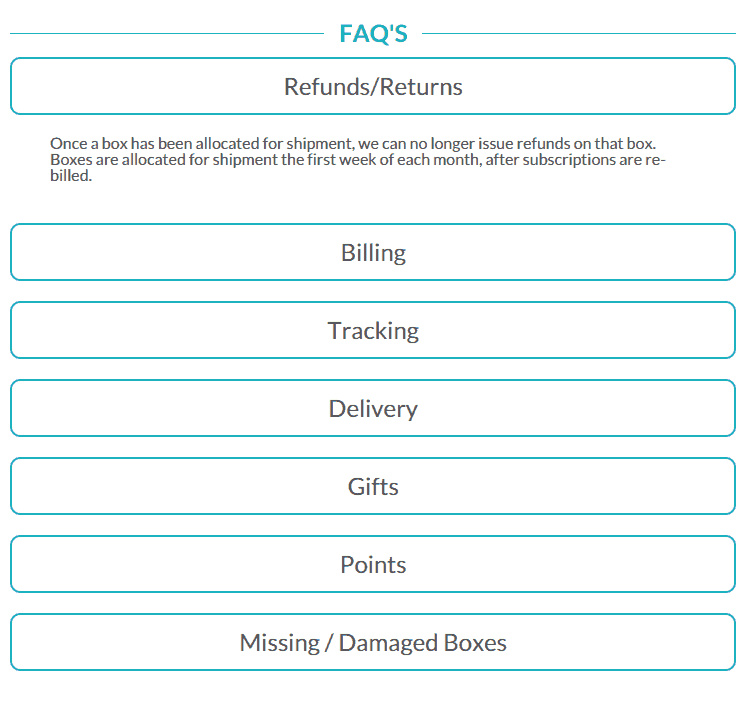In a world where you can find anything you want, it is infinitely more difficult to find what you want. It is the land of curation that brings joy to monthly subscribers around the world. The niche subscription box business is a great opportunity for business owners with a passion, but like any business, a web of legal pitfalls lies ahead.
This particular guide focuses on the terms and conditions that each consumer should agree to before becoming a subscriber.
Despite the casualness of fine print terms and conditions contained in any online sale, these “shrink-wrapped” legal texts are in fact enforceable contracts–if done correctly. As such, they need to be treated in the same fashion as any contract agreement by going through the same formalities that you would go through for any contract agreement.
Here are some important tips for terms and conditions for subscription based box businesses:
Please Use Terms and Conditions
You would be surprised to see that some well established subscription box websites do not even have any terms and conditions. In their hip, startup fashion, they depend upon the plain language used through the checkout process and email confirmations.
The problem with this is that these quasi-terms and conditions are written from the lens of a marketer. Keeping it simple stupid (KISS) is just plain naive.
There is nothing wrong with plain language. In fact, good attorneys actually prefer plain language, but there is a difference between plain and simple.
Your Terms and Conditions May Not Even Be Enforceable
There are two general types of terms and conditions that have been held enforceable: the clickwrap and browsewrap. One has a clear advantage over the other.
The clickwrap is where the website user is required to take some action to express the user’s assent to the terms and conditions. You will often see this as a scrollable iframe with the terms and conditions and a checkbox saying that “I agree” or “I have read and understood the terms and conditions.” This is a more classical method of online contracting and has become less common.
Browsewrap is where the terms and conditions are linked, usually on every page in the footer section of the site. In this case, the user does not have to do anything to actually manifest the user’s assent to the actual terms and conditions.
It may be obvious, but a browsewrap agreement is much more difficult to enforce unless there is some conspicuous notice that the purchase or sale is subject to the terms and conditions.
The most common method websites use is a “click and accept” of sorts. For simplicity in the signup process and design, most sites do not want the user to go through the “I agree” checkbox as you would with clickwrap. On the registration or checkout form, the user is given a clear and conspicuous notice that by “clicking here you acknowledge you have read and understood the terms and conditions” with a link to the actual terms. NatureBox, like most subscription sites, use this method:
The reality is that if your users are registering, signing up, or paying for anything, a clear notice to the user with a clickwrap or the method above is the clear way to go in order to maximize the chance of enforceability. Additionally, easy access to such terms and conditions are a way to create clear expectations between your business and your customers.
Monkey See, Monkey Do, Do Not Copy Terms and Conditions
 If you do a quick review of the many box subscription websites, you will see many of these sites have literally copied and pasted the same exact terms and conditions for their respective use. Though it is possible that the same attorney drafted these terms or they collectively agreed to share such information, without such consent, this could be copyright infringement. More importantly, these “standard” terms and conditions that seem to be floating contain typos or even nonsensical errors.
If you do a quick review of the many box subscription websites, you will see many of these sites have literally copied and pasted the same exact terms and conditions for their respective use. Though it is possible that the same attorney drafted these terms or they collectively agreed to share such information, without such consent, this could be copyright infringement. More importantly, these “standard” terms and conditions that seem to be floating contain typos or even nonsensical errors.
Other sites mistakenly use so-called generic terms and conditions that could apply to any website. They mention no subscription based sale of services or goods. This is equally useless.
Clearly Disclose Auto-Renewal and Subscription Policies
For most subscription-based businesses, your customers are typically consumers (not B2B, but B2C). Consumer protection laws address aspects of auto-renewals on a federal and state level. Providing that most online-based businesses target nationwide, even worldwide, customers, it is a matter of due diligence to comply with the strictest of consumer protection laws.
Specifically, California’s Automatic Renewal Law contained in California Business and Professions Code §17600, et seq. is the model consumer protection law dealing with automatic subscriptions. Though each state may have other approaches, the general concept that each of these consumer protection laws have in common is that any kind of auto-renewal subscription should be clear and conspicuous.
California has its own definition of what is clear and conspicuous, and though it may seem like common sense, major companies have fallen victim to lawsuits (see Hulu class action and Spotify Lawsuit) surrounding auto-renewal, especially where a free trial is involved.
How to Handle Subscription Cancellations
Similar to the auto-renewal disclosure, you must provide your customers a simple way of cancelling the subscription. Though, it is not to say that the cancellation must be right away. After all, the cell phone industry has trained consumers to expect two-year contract terms, but the standard seems to be a monthly subscription with the ability to cancel at any time before the anniversary date. There is usually some incentive or discount price for signing up for a year or three plus months in advance. Loot Crate utilizes this multi-tier plan:
Pricing Error Procedures
Mistakes happen. Big to small retailers make mistakes caused by a numerous different reasons related to pricing errors. Though such intentional errors may give rise to a bait and switch from the FTC, companies are not necessarily forced to accept the incorrect price when it is in the customer’s favor.
With subscription-based box businesses with variable prices for product in each box, the customer’s credit card is charged automatically before shipment. What happens if the customer chose items that were under-priced mistakenly? A provision dealing with this issue in your terms and conditions can make it clear that you are able to cancel and refund the order in such case. The provision is a fail-safe to the common law contract rule of unilateral mistake of fact that in some cases allows the party making the mistake to void a contract.
Do not think you are immune to these kinds of mistakes. The cause could be technical, typo, or even a miscalculation on margin. Every business, including yours will have one of those crazy customers that could make a pricing error a significant ordeal. Think about the Harvard law professor who fought with a restaurant over a $4 discrepancy in his bill.
Delayed, Lost or Damaged Shipment
Who is responsible if a shipped good becomes delayed, lost, or damaged? The risk of loss for shipping is typically a negotiated term between buyer and seller in commercial transactions, but in consumer transactions, the default is to pass on the risk to the common carrier (USPS, UPS, FedEx, etc.). In order to do so, however, such provisions of the terms and conditions must specify that the risk of loss is transferred to Buyer upon delivery to the common carrier and not the default for merchants, i.e. delivery to the Buyer. Despite even having such a provision, many sites take on the loss anyway and reship items accordingly. To protect yourself from fraudulent customers, make sure you track and possibly insure against.
If you are in business long enough, you will have lost, delayed, damaged, and stolen packages.
https://www.youtube.com/watch?v=lM3SRG7D21Y
Refunds, Exchanges, Returns
Unless the goods or service is defective somehow, there is no general requirement for your business to require returns in most jurisdictions; however, consumers have come to expect some kind of return policy. Well defined return policies should be set forth clearly.
Some subscription-based box businesses do not allow any returns. In this case, it would be prudent to make it clear at checkout that sales are final due to the common expectation of most consumers.
Quantity Limits
Your customer may have the ability to order multiple quantities of the same product. If they get a little savvy and want to resell a large amount of that great deal you curated for them, you will want to have the right to limit the quantity of the sale. You do not necessarily need a provision preventing this since you can have control on the technical side of your online store in controlling quantity orders.
Disclaimers of Warranty
When selling any goods, whether as a manufacturer or reseller, there are some warranties that automatically come with the sale, e.g. the product will be free from design defects.
On the other hand, some representations or statements you may make in relation to the sale may create additional warranties, e.g., this blender has 27,000 RPM.
Express and implied warranties are promises made by you that either need to be fulfilled or disclaimed. The problem is that not all warranties may be disclaimed.
For example, most states will not allow you to disclaim a product by selling it “as is” in the same manner that you would sell a product on eBay “as is.” The law will, for example, allow you to modify or disclaim the implied warranty of fitness.
FAQ Legal Effect
Due to the still new nature of the subscription box business, many sites include a FAQ outlining in laymen terms how the subscription works. Creating clear expectations between the parties are of utmost importance, especially when dealing with consumers.
The concern of the FAQ is what if there is a conflict between a statement in the FAQ and a provision of the terms and conditions. Under normal circumstances, the terms and conditions would contain a “merger clause” that would state that the terms and conditions are the only terms that govern the sale.
Unfortunately, it may not be as simple as that. Even if a court would determine that the FAQ is not a part of the legal agreement, there is no doubt that the FAQ is a part of your marketing and advertising. If such conflict does exist, it could be suggested that you misrepresented your product or service.
The FAQ, like your terms and conditions, should be reviewed in the same exactness as your terms and conditions. Without any conflict and the FAQ being a supplement to the terms and conditions, there would be no concern whether or not the FAQ is included within the legal agreement or not.
Here is Conscious Box’s FAQ:
Member Eligibility Restrictions
Some subscription-based box sites have added a member eligibility section. Most of the time this includes aspects of providing accurate information and making payments, but some have even made more specific restrictions that may actually violate civil rights.
Civil rights statutes prohibit discrimination against certain classes of people in places of public accommodation. Places of public accommodation, such as schools, hospitals, hotels, are establishments in which “the public at large are invited.” In deciding whether anti-discrimination laws apply to a given business, judges in federal courts will define the term “place of public accommodation” more narrowly, while state laws will interpret the term more widely.
There are many sites that provide boxes targeted with specific interests. Since these sites have a risk of being considered a public accommodation, it is prudent to not exclude women from your men focused boxes or men from your women focused boxes.
Since selling to minors for certain products or collecting information for users under the age of 13 has additional requirements, restrictions of minimum age are typically advisable.
Other Common Issues
Change of Address
The party that is in the position to prevent the loss should be placed in the position to take on that risk. When shipping to consumer address, they, not you, should take on the burden that the address is not only accurate but up-to-date as the subscription continues. Though this aspect of the terms and conditions may be covered in the returns policy, it should be stated clearly that the customer is the one that needs to ensure that the address is up-to-date regardless as to whether you subscribe to a service to be informed of any change of addresses.
Referral Programs
A popular way to market your subscription site is through affiliate or referral program marketing. This method seems to be very prevalent in this particular industry. Often it can be as simple as “refer a friend and get $5 off.”
The terms and conditions should specify each aspect of such programs. For example, you would not want these referral source spamming random emails all day long to get a discount or misrepresenting your service altogether. You would also want to specify how and when the discount is applied.
The easiest way to approach a referral program is to add an entire full section of terms and conditions related to the referral program instead of adding a provision as if it was an afterthought.
Sales Tax
Some sites have chosen to include provisions related to sales tax in order to inform the buyer clearly whether sales tax will be charged or not. It is not as important to include this in your terms and conditions as it is important to make sure you are collecting sales tax appropriately.
The area of sales tax for eCommerce is an overly complicated burden on all sellers, but you better know how to deal with this.
Repackaging, Relabeling, and Use of Trademarks
Many subscription box sites curate products from third parties to resell. Some may even white label these products. Though the contract agreements between you and these manufacturers or wholesalers are a separate issue, disclaiming your affiliation from the original brands may be a requirement from your distribution agreement.
Reserving Right to Replace or Modify Package
Some sites have a policy that they can basically change the order in the event that certain quantities are not available. Though an unusual provision, depending upon how it is written and the circumstances of the subscription program, it can be made enforceable. Like everything else, so long as this is adequately disclosed then your customers may be understanding (assuming they receive something of equal or more value).
General Provisions
In every contract agreement, there are some general provisions that may be seamlessly included in any agreement. For example, venue, choice of law, the previously mentioned merger clause are all typical examples. Arbitration and waivers of a class action have been legally tested with consumer contracts in the past, but they generally may also be included.
Though these are typically considered “standard” provisions, you should not assume that someone else’s standard provisions should also be your standard provision.
Discounts and Coupons
Discount codes and coupons have their own set of laws that need to be understood before running any discount or coupon promotion. Some related provisions may be included within the terms and conditions, but it is more appropriate to include such terms within the four corners of the discount or coupon promotion.





![Law in the Digital Age: Exploring the Legal Intricacies of Artificial Intelligence [e323]](https://www.pashalaw.com/wp-content/uploads/2023/11/WhatsApp-Image-2023-11-21-at-13.24.49_4a326c9e-1024x723.jpg)




![Fight for Your [Trademark] Rights | Behind the Buy [6/8] [307]](https://www.pashalaw.com/wp-content/uploads/2020/07/Fight-for-your-trademark-right-1024x683.jpg)




![Law in the Digital Age: Exploring the Legal Intricacies of Artificial Intelligence [e323]](https://www.pashalaw.com/wp-content/uploads/2023/11/WhatsApp-Image-2023-11-21-at-13.24.49_4a326c9e-300x212.jpg)
![Unraveling the Workforce: Navigating the Aftermath of Mass Layoffs [e322]](https://www.pashalaw.com/wp-content/uploads/2023/07/Untitled-design-23-300x212.png)
![Return to the Office vs. Remote: What Can Employers Legally Enforce? [e321]](https://www.pashalaw.com/wp-content/uploads/2023/01/Pasha_LSSB_321_banner-300x212.jpg)
![Explaining the Hans Niemann Chess Lawsuit v. Magnus Carlsen [e320]](https://www.pashalaw.com/wp-content/uploads/2022/10/LAWYER-EXPLAINS-7-300x169.png)
![California v. Texas: Which is Better for Business? [313]](https://www.pashalaw.com/wp-content/uploads/2021/07/Pasha_LSSB_CaliforniaVSTexas-300x212.jpg)
![Buyers vs. Sellers: Negotiating Mergers & Acquisitions [e319]](https://www.pashalaw.com/wp-content/uploads/2022/06/Pasha_LSSB_BuyersVsSellers_banner-300x212.jpg)
![Employers vs. Employees: When Are Employment Restrictions Fair? [e318]](https://www.pashalaw.com/wp-content/uploads/2022/05/Pasha_LSSB_EmployeesVsEmployers_banner-1-300x212.jpg)
![Vaccine Mandates Supreme Court Rulings [E317]](https://www.pashalaw.com/wp-content/uploads/2022/02/WhatsApp-Image-2022-02-11-at-4.10.32-PM-300x212.jpeg)
![Business of Healthcare [e316]](https://www.pashalaw.com/wp-content/uploads/2021/11/Pasha_LSSB_BusinessofHealthcare_banner-300x212.jpg)
![Social Media and the Law [e315]](https://www.pashalaw.com/wp-content/uploads/2021/10/WhatsApp-Image-2021-10-06-at-1.43.08-PM-300x212.jpeg)
![Defining NDA Boundaries: When does it go too far? [e314]](https://www.pashalaw.com/wp-content/uploads/2021/09/Pasha_LSSB_NDA_WordPress-2-300x212.jpg)
![More Than a Mistake: Business Blunders to Avoid [312] Top Five Business Blunders](https://www.pashalaw.com/wp-content/uploads/2021/06/Pasha_LSSB_Blunders_WP-1-300x212.jpg)
![Is There a Right Way to Fire an Employee? We Ask the Experts [311]](https://www.pashalaw.com/wp-content/uploads/2021/02/Pasha_LSSB_FireAnEmployee_Website-300x200.jpg)
![The New Frontier: Navigating Business Law During a Pandemic [310]](https://www.pashalaw.com/wp-content/uploads/2020/12/Pasha_LSSB_Epidsode308_Covid_Web-1-300x200.jpg)
![Wrap Up | Behind the Buy [8/8] [309]](https://www.pashalaw.com/wp-content/uploads/2020/11/Pasha_BehindTheBuy_Episode8-300x200.jpg)
![Is it all over? | Behind the Buy [7/8] [308]](https://www.pashalaw.com/wp-content/uploads/2020/09/iStock-1153248856-overlay-scaled-300x200.jpg)
![Fight for Your [Trademark] Rights | Behind the Buy [6/8] [307]](https://www.pashalaw.com/wp-content/uploads/2020/07/Fight-for-your-trademark-right-300x200.jpg)
![They Let It Slip | Behind the Buy [5/8] [306]](https://www.pashalaw.com/wp-content/uploads/2020/06/Behind-the-buy-they-let-it-slip-300x200.jpg)
![Mo’ Investigation Mo’ Problems | Behind the Buy [4/8] [305]](https://www.pashalaw.com/wp-content/uploads/2020/05/interrobang-1-scaled-300x200.jpg)
![Broker or Joker | Behind the Buy [3/8] [304] Behind the buy - Broker or Joker](https://www.pashalaw.com/wp-content/uploads/2020/04/Joker-or-Broker-1-300x185.jpg)
![Intentions Are Nothing Without a Signature | Behind the Buy [2/8] [303]](https://www.pashalaw.com/wp-content/uploads/2020/04/intentions-are-nothing-without-a-signature-300x185.jpg)
![From First Steps to Final Signatures | Behind the Buy [1/8] [302]](https://www.pashalaw.com/wp-content/uploads/2020/04/first-steps-to-final-signatures-300x185.jpg)
![The Dark-side of GrubHub’s (and others’) Relationship with Restaurants [e301]](https://www.pashalaw.com/wp-content/uploads/2015/04/When-Competition-Goes-Too-Far-Ice-Cream-Truck-Edition-300x201.jpg)
![Ultimate Legal Breakdown of Internet Law & the Subscription Business Model [e300]](https://www.pashalaw.com/wp-content/uploads/2019/05/Ultimate-Legal-Breakdown-of-Internet-Law-the-Subscription-Business-Model-300x196.jpg)
![Why the Business Buying Process is Like a Wedding?: A Legal Guide [e299]](https://www.pashalaw.com/wp-content/uploads/2019/03/futura-300x169.jpg)
![Will Crowdfunding and General Solicitation Change How Companies Raise Capital? [e298]](https://www.pashalaw.com/wp-content/uploads/2018/11/Will-Crowdfunding-and-General-Solicitation-Change-How-Companies-Raise-Capital-300x159.jpg)
![Pirates, Pilots, and Passwords: Flight Sim Labs Navigates Legal Issues (w/ Marc Hoag as Guest) [e297]](https://www.pashalaw.com/wp-content/uploads/2018/07/flight-sim-labs-300x159.jpg)
![Facebook, Zuckerberg, and the Data Privacy Dilemma [e296] User data, data breach photo by Pete Souza)](https://www.pashalaw.com/wp-content/uploads/2018/04/data-300x159.jpg)
![What To Do When Your Business Is Raided By ICE [e295] I.C.E Raids business](https://www.pashalaw.com/wp-content/uploads/2018/02/ice-cover-300x159.jpg)
![General Contractors & Subcontractors in California – What you need to know [e294]](https://www.pashalaw.com/wp-content/uploads/2018/01/iStock-666960952-300x200.jpg)
![Mattress Giants v. Sleepoplis: The War On Getting You To Bed [e293]](https://www.pashalaw.com/wp-content/uploads/2017/12/sleepopolis-300x159.jpg)
![The Harassment Watershed [e292]](https://www.pashalaw.com/wp-content/uploads/2017/12/me-2-300x219.jpg)
![Investing and Immigrating to the United States: The EB-5 Green Card [e291]](https://www.pashalaw.com/wp-content/uploads/2012/12/eb-5-investment-visa-program-300x159.jpg)
![Responding to a Government Requests (Inquiries, Warrants, etc.) [e290] How to respond to government requests, inquiries, warrants and investigation](https://www.pashalaw.com/wp-content/uploads/2017/10/iStock_57303576_LARGE-300x200.jpg)
![Ultimate Legal Breakdown: Employee Dress Codes [e289]](https://www.pashalaw.com/wp-content/uploads/2017/08/Ultimate-Legal-Breakdown-Template-1-300x159.jpg)
![Ultimate Legal Breakdown: Negative Online Reviews [e288]](https://www.pashalaw.com/wp-content/uploads/2017/06/Ultimate-Legal-Breakdown-Online-Reviews-1-300x159.jpg)
![Ultimate Legal Breakdown: Social Media Marketing [e287]](https://www.pashalaw.com/wp-content/uploads/2017/06/ultimate-legal-breakdown-social-media-marketing-blur-300x159.jpg)
![Ultimate Legal Breakdown: Subscription Box Businesses [e286]](https://www.pashalaw.com/wp-content/uploads/2017/03/ultimate-legal-breakdown-subscription-box-services-pasha-law-2-300x159.jpg)
![Can Companies Protect Against Foreseeable Misuse of Apps [e285]](https://www.pashalaw.com/wp-content/uploads/2017/01/iStock-505291242-300x176.jpg)
![When Using Celebrity Deaths for Brand Promotion Crosses the Line [e284]](https://www.pashalaw.com/wp-content/uploads/2017/01/celbrity-300x159.png)
![Are Employers Liable When Employees Are Accused of Racism? [e283] Racist Employee](https://www.pashalaw.com/wp-content/uploads/2016/12/Are-employers-liable-when-an-employees-are-accused-of-racism-300x159.jpg)
![How Businesses Should Handle Unpaid Bills from Clients [e282] What to do when a client won't pay.](https://www.pashalaw.com/wp-content/uploads/2016/12/How-Businesses-Should-Handle-Unpaid-Bills-to-Clients-300x159.png)
![Can Employers Implement English Only Policies Without Discriminating? [e281]](https://www.pashalaw.com/wp-content/uploads/2016/11/Can-Employers-Impliment-English-Only-Policies-Without-Discriminating-300x159.jpg)
![Why You May No Longer See Actors’ Ages on Their IMDB Page [e280]](https://www.pashalaw.com/wp-content/uploads/2016/10/IMDB-AGE2-300x159.jpg)
![Airbnb’s Discrimination Problem and How Businesses Can Relate [e279]](https://www.pashalaw.com/wp-content/uploads/2016/09/airbnb-300x159.jpg)
![What To Do When Your Amazon Account Gets Suspended [e278]](https://www.pashalaw.com/wp-content/uploads/2016/09/What-To-Do-When-Your-Amazon-Account-Gets-Suspended-1-300x200.jpg)
![How Independent Artists Reacted to Fashion Mogul Zara’s Alleged Infringement [e277]](https://www.pashalaw.com/wp-content/uploads/2016/08/How-Independent-Artists-Reacted-to-Fashion-Mogul-Zaras-Alleged-Infringement--300x159.jpg)
![Can Brave’s Ad Replacing Software Defeat Newspapers and Copyright Law? [e276]](https://www.pashalaw.com/wp-content/uploads/2016/08/Can-Braves-Ad-Replacing-Software-Defeat-Newspapers-and-Copyright-Law-300x159.jpg)
![Why The Roger Ailes Sexual Harassment Lawsuit Is Far From Normal [e275]](https://www.pashalaw.com/wp-content/uploads/2016/07/WHY-THE-ROGER-AILES-SEXUAL-HARASSMENT-LAWSUIT-IS-FAR-FROM-NORMAL-300x159.jpeg)
![How Starbucks Turned Coveted Employer to Employee Complaints [e274]](https://www.pashalaw.com/wp-content/uploads/2016/07/iStock_54169990_LARGE-300x210.jpg)
